
No. 10, 2023 | 17 August 2023
Go to:
From FRSA's Executive Director
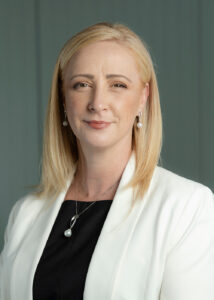
I have been thinking a lot over the past week or so on the role our sector plays in helping keep women and children safe from family violence. In part this has been prompted by a series of media reports about women who have been violently murdered by their intimate partners. My heart breaks for these women and for their families and friends and I can’t help but ask a million questions about why the lives of these women (and their children) needed to end in such a tragic, violent way. I have also been catching up with members – some face to face and others virtually, and the impact and the prevalence of family violence as a risk factor in the families they are working with is ever present in these conversations. What they are doing and how they are responding of course depends on what sort of program they are delivering but the key message here is, as many say – family violence is not something impacting on small numbers of people in limited locations. It is rife – especially when we start talking about working with vulnerable and disadvantaged children, young people, adults and communities.
From the Australian Child Maltreatment Study we know that 39.6% of Australians experience exposure to domestic violence as children. Back in 2017 (pre-pandemic) our members delivering family law services reported that family violence was present in 60-80% of cases at the point of intake. For FRSA this confirms the need for more early intervention supports for children and families and for ongoing (and funded) family and domestic training for all our family and relationship services workers. Working with families experiencing or at risk of family violence is par for the course for our sector and the more our workforce is supported in this work, the more they can help to keep the families they work with safe.
Last Friday our Manager, Policy & Research, Robyn, and I gave evidence to the Senate Committee inquiring into the Family Law Amendment Bill. One of the principal objectives of these legislative amendments is to make the family law system safer for separating families. This is certainly something FRSA supports. But, as I explained to the Committee, to be truly effective, legislation must be supported by broader system change, including increased social and therapeutic supports.
I was therefore reassured to see that in the much-awaited First Action Plan under the National Plan to End Violence against Women and Children, which was released on Wednesday alongside the Aboriginal and Torres Strait Islander Action Plan, inclusion of a number of Actions that speak directly to a range of social and therapeutic supports that the Australian, state and territory governments have committed to. Given the Senate Committee’s interest on Friday last week about family violence training – I also note that the First Action Plan also contains a direct action to increase and strengthen the capability of mainstream as well as specialist workforces. The Action Plan also notes the need for training and support for practitioners and first responders to maintain their own mental wellbeing while supporting victim-survivors. Looking after our essential workers in this field is vitally important if we are to ensure we are able and ready to support those in need.
Kind regards,
Jackie Brady
FRSA Executive Director
Strategic Leadership Forum 2023 - Register today!
Less than a month till this year’s Strategic Leadership Forum (SLF)! Don’t forget to register for SLF on 12-13 September 2023 in Canberra.
We’ll be joined by the Attorney-General, The Hon Mark Dreyfus KC MP at the SLF breakfast event, which will also see the launch of the Family & Relationship Services Sector Cost Benefit Analysis Report which FRSA commissioned the Centre for International Economics to undertake.
Click the button below to access the registration website. This is an FRSA Members only event.
Stay tuned for more details on the event including the program, speakers, accommodation and more. Make sure you receive the latest information about SLF 2023 by subscribing to the mailing list on the SLF webpage.
If you have any questions, please contact the National Office on (02) 6162 1811 or email our Events and Membership Officer, Narelle at events@frsa.org.au.
State of the nation report: social connection in Australia 2023
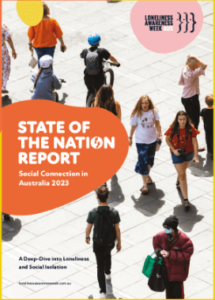 Ending Loneliness Together has released a report, State of the nation report: social connection in Australia 2023, as part of this year’s first Loneliness Awareness Week held during 7-13 August 2023.
Ending Loneliness Together has released a report, State of the nation report: social connection in Australia 2023, as part of this year’s first Loneliness Awareness Week held during 7-13 August 2023.
The aim of this study is to understand the distribution of social health across the Australian population and examine the relationships between loneliness and social isolation and community knowledge, stigma, physical and mental health, health service utilisation, quality of life, and work productivity.
The report provides insights from over 4000 people aged 18 to 92 years as a snapshot of Australia’s understanding and experiences of loneliness and social isolation.
The report reviews the knowledge, concealment, community stigma, and shame towards loneliness in Australian society. It also explores the impacts of loneliness on health, wellbeing, and workplace productivity.
The report recommends these four actions:
- Build our understanding of loneliness through scientific research
- Normalise conversations about loneliness
- Empower communities to help each other
- Establish a peak body
New report shows essential workers are being hit hard by rental crisis
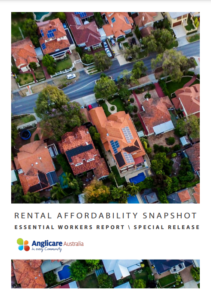 Anglicare Australia’s 2023 Rental Affordability Snapshot surveyed rental listings across Australia and found that affordability has crashed to record lows. This year they have released a companion report focusing on rental affordability for essential workers.
Anglicare Australia’s 2023 Rental Affordability Snapshot surveyed rental listings across Australia and found that affordability has crashed to record lows. This year they have released a companion report focusing on rental affordability for essential workers.
The Snapshot surveyed 45,895 rental listings across Australia and found that:
- 1087 rentals (2.4%) were affordable for an ambulance worker
- 666 rentals (1.5%) were affordable for a nurse
- 582 rentals (1.3%) were affordable for a construction worker
- 507 rentals (1.1%) were affordable for an aged care worker
- 428 rentals (0.9%) were affordable for an early childhood educator
- 424 rentals (0.9%) were affordable for a hospitality worker.
“So many essential industries are facing workforce shortages with workers unable to afford to stay or move to parts of the country where these shortages are at their worst. These numbers help explain why,” said Anglicare Australia Executive Director, Kasy Chambers.
“Virtually no part of Australia is affordable for aged care workers, early childhood educators, cleaners, nurses and many other essential workers we rely on. They cannot afford to live in their own communities.”
In response to the findings, Anglicare Australia is calling for more social housing to end the shortfall of 640,000 homes. Read the full reports.
Punishment for Profit – report released
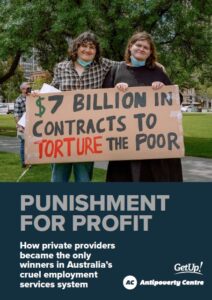 A new report from the Antipoverty Centre and GetUp shows ‘mutual’ obligations – the system of welfare compliance managed by privatised employment service providers at a cost of $4 billion a year – cause mental ill health, do not help welfare recipients find work and push people into further financial hardship.
A new report from the Antipoverty Centre and GetUp shows ‘mutual’ obligations – the system of welfare compliance managed by privatised employment service providers at a cost of $4 billion a year – cause mental ill health, do not help welfare recipients find work and push people into further financial hardship.
The research drew on the expertise and experiences of 600 welfare recipients and analysis of government data, media coverage and company reports.
The research found that:
- The current mutual obligations system, coupled with payment rates, is trapping people in long-term unemployment. This has seen a large increase in the average time on JobSeeker, from about 2 years in 2014 to more than 5.5 years now.
- 93.35% of survey respondents said ‘mutual obligations have had a negative effect on mental health.
- 52.53% of survey respondents had been mistreated at an organisation involved in ‘mutual obligations’.
The report is available here.
National Plan to End Violence against Women and Children 2022-2032 – Action Plans released
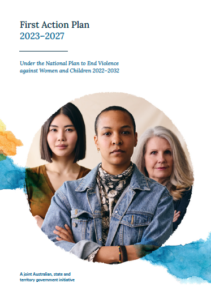 The first Action Plan and the discrete Aboriginal and Torres Strait Islander Action Plan under the National Plan to End Violence against Women and Children were released by the Albanese Government on 16 August.
The first Action Plan and the discrete Aboriginal and Torres Strait Islander Action Plan under the National Plan to End Violence against Women and Children were released by the Albanese Government on 16 August.
All Australian Governments have agreed to concrete actions and targets to end gender-based violence. These actions are urgently needed with one in four women experiencing intimate partner violence and Aboriginal and Torres Strait Islander women experiencing even higher rates of violence.
Actions outlined in the Plans for governments to work towards include:
- Developing a range of supporting resources to help promote and implement the National Principles to Address Coercive Control in Family and Domestic Violence
- Providing services in prisons and places of detention for Aboriginal and Torres Strait Islander people who are both victims and perpetrators of family, domestic and sexual violence, including children
- Establishing an Aboriginal and Torres Strait Islander Men’s Advisory Body to provide advice and leadership on issues such as family violence, gender equality, programs and services for men, boys and men’s issues in general
- Bolstering trauma-informed supports and exploring new innovative models for recovery for victim-survivors of family, domestic and sexual violence
- Funding education and training on family, domestic and sexual violence for community mainstream workers, health professionals, and the justice sector including training and capacity-building training for judicial and legal practitioners
- Implementing measures that provide a connected and coordinated response to address technology-facilitated abuse, including a national support service to assist victim survivors as well as frontline service staff
More information about the National Plan to End Violence and supporting Action Plans is available here.

Consultation on new Mental Health and Wellbeing Strategy for Defence personnel, veterans and families underway
Defence and the Department of Veterans’ Affairs (DVA) are working together to develop a new joint Defence and Veteran Mental Health and Wellbeing Strategy in 2023.
Working in concert to develop the strategy will enable Defence and DVA to adopt a coordinated approach to meeting the mental health and wellbeing needs of serving members and veterans along a lifetime continuum – during service, transition, and life post-transition.
Minister for Veterans’ Affairs and Minister for Defence Personnel, The Hon Matt Keogh MP said, “The Strategy will encourage positive mental health and wellbeing across the Defence and veteran community. It aims to improve prevention, early intervention and care initiatives for veterans and families from the day someone signs up for the ADF, to long after they’ve hung up their uniform for the last time.”
“Undertaking comprehensive consultation is fundamental to the Strategy development process, and it is important we hear directly from those this Strategy will support.”
Defence and DVA will be undertaking various consultations with the broad Defence and veteran community to inform the development of the strategy.
An online survey is also open until 28 August 2023 for DVA clients, families and support services.
For more information on the Strategy development process, visit the DVA Web page.
Submissions open for Multicultural Framework Review
Submissions are now open for the Multicultural Framework Review, which is being coordinated by the Department of Home Affairs.
The Review will assess and make recommendations on the institutional arrangements, legislative and policy settings required to advance a multicultural Australia and meet the current and future needs of multicultural Australia at the Commonwealth level.
The Government has appointed a three-member Panel to conduct the Review, supported by a Reference Group. The Panel invites submissions that respond to the terms of reference, seeking views on what is working well and what could be better.
Submission close on 29 September 2023.
National Housing and Homelessness Plan consultation
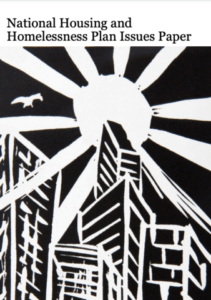 To help more Australians access safe and affordable housing, the Australian Government is developing a National Housing and Homelessness Plan (the Plan) in collaboration with state and territory governments. The Plan will be a 10-year strategy. It will set out a shared vision to inform future housing and homelessness policy in Australia.
To help more Australians access safe and affordable housing, the Australian Government is developing a National Housing and Homelessness Plan (the Plan) in collaboration with state and territory governments. The Plan will be a 10-year strategy. It will set out a shared vision to inform future housing and homelessness policy in Australia.
The Plan will set out the key short, medium and longer term reforms needed to address housing challenges. They have released an Issues Paper which provides a brief overview of some of the known issues in different parts of the housing and homelessness systems, and poses a series of discussion questions.
You are invited to share your ideas and experiences by either responding to guided, short-form questions or lodging a written submission.
The Issues Paper contains questions for consideration against each of the focus areas that you might like to think about when making your submission. Submissions close at 11:59pm AEST on Friday, 22 September 2023.
Inquiry into school refusal – Report tabled
Last week the Senate Committee on Education and Employment tabled its report – The national trend of school refusal and related matters.
The increase in ‘school refusal’ is something that family and relationship service providers working with children and young people have observed since the pandemic and reflected on in Community of Practice discussions – particularly providers delivering Family Mental Health Support Services (FMHSS).
School refusal is not the same as truancy and many practitioners prefer to use other language such as school avoidance or attendance anxiety reflecting the fact that for a lot of kids it is not that they are refusing to go to school – they feel that they can’t.
The matter was referred to the committee in October last year and considered the increase in school refusal, the impacts on young people and families, the demands on school supports and ways to address the issue.

FRSA meets with some members in Western Sydney last week
Last week, FRSA Executive Director, Jackie Brady was out and about meeting some members in Western Sydney including, Boronia Multicultural Services and CatholicCare Western Sydney and the Blue Mountains.
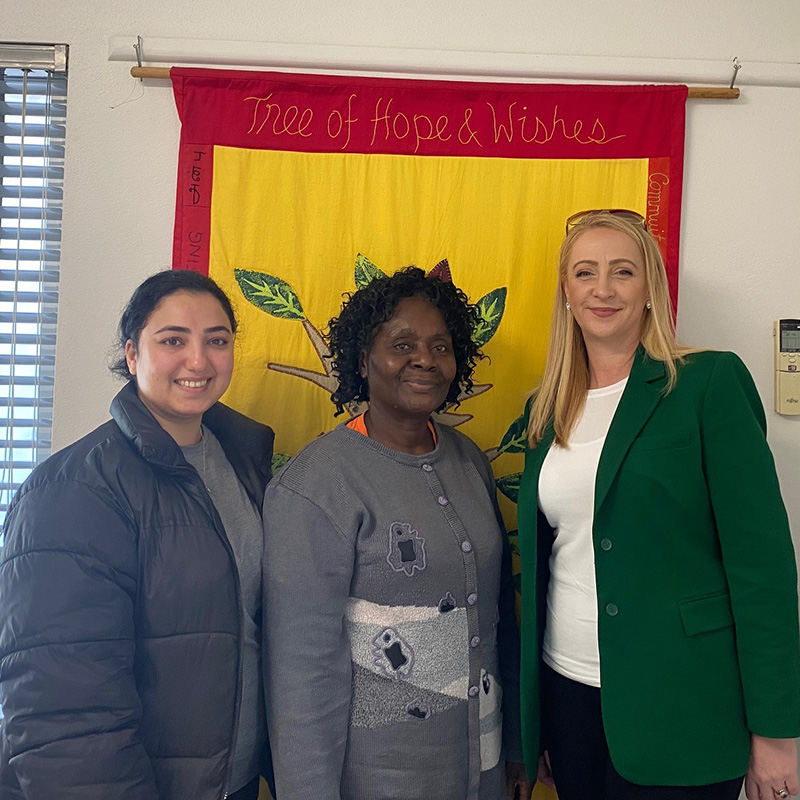
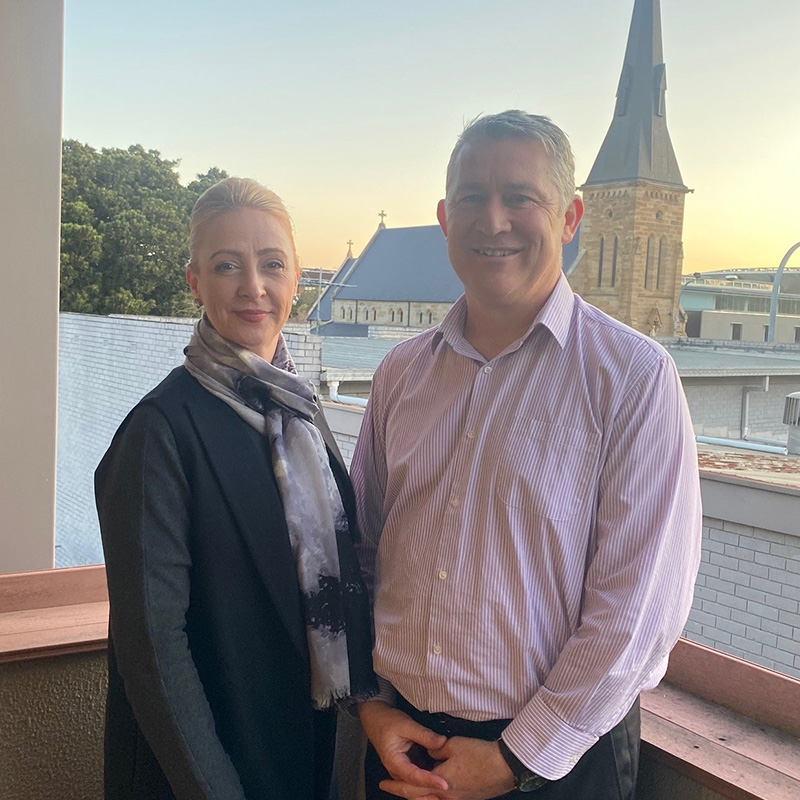
Stunning new mural in Toowoomba thanks to CatholicCare Social Services Southern QLD
Last month, as part of NAIDOC week, mural artist Matt Adnate completed a new artwork at QIC’s Grand Central shopping centre in Toowoomba.
The mural was commissioned by local social enterprise Adapt Mentorship, with the assistance of funding from CatholicCare Social Services Southern QLD. The mural is a portrait of a young Aboriginal girl on the 10m by 5m wall and was completed in three days. It aims to serves as a conversation starter and is Adnate’s second mural in Toowoomba. Check out CatholicCare staff at the opening:
FRSA members winners of Social Impact Leadership Australia program
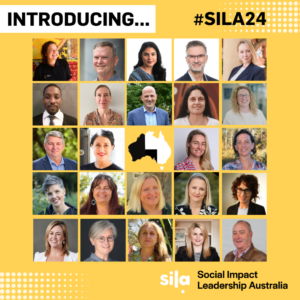 Congratulations to FRSA Members, Andrea Creado, CEO of Ishar Multicultural Women’s Health Services and Claire Ralfs, CEO of Relationships Australia South Australia, who were recently selected to participate in cohort three of the Social Impact Leadership Australia program.
Congratulations to FRSA Members, Andrea Creado, CEO of Ishar Multicultural Women’s Health Services and Claire Ralfs, CEO of Relationships Australia South Australia, who were recently selected to participate in cohort three of the Social Impact Leadership Australia program.
Created by the Centre for Social Impact, the 10-month SILA Program has been designed and developed to allow for 24 for-purpose CEO participants in each cohort.
SILA focuses on leadership development and capacity building for CEOs (or equivalent) of for-purpose organisations in Australia with the aim of disrupting common ideas of leadership, to ultimately create greater social impact across Australia.
Last year FRSA members, Aileen Ashford from Kids First Australia and Michael Kelly from Relationships Australia Tasmania, were chosen to take part in the the previous cohort.
2023 Victorian Protecting Children Awards
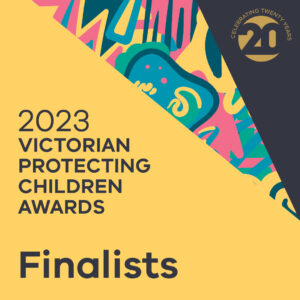 Congratulations to FRSA Members who’s staff have been named finalists in the annual Victorian Protecting Children Awards.
Congratulations to FRSA Members who’s staff have been named finalists in the annual Victorian Protecting Children Awards.
The awards recognise and celebrate individuals, teams and groups who demonstrate excellence in working with children, young people and families.
There were 11 Victorian Protecting Children Awards categories open to nominations for those working across the child and family services sector, child protection, government and academic organisations, and foster, kinship and permanent carers, volunteers, and community members. The winners will be announced at the awards ceremony on Tuesday, 5 September.
FRSA Members who are finalists:
- Anne Tidymann, Odyssey House Victoria who is nominated for the Robin Clark Leadership Award.
- Gippsland Anglicare Victoria Multisystemic Therapy Team, Anglicare Victoria and Woodend Road, MacKillop Family Services who are nominated for the Robin Clark Marking a Difference Award.
- Amy Baudinette and Colin Cheater, MacKillop Family Services, Emily White, OzChild, Leonie Patterson, OzChild and Sue and Lee Wakeman, MacKillop Family Services who are nominated for the Carer Award.
- Transforming Educational Achievement for Children at Risk (TEACHaR) Leadership Team, Anglicare Victoria who are nominated for the Engaging Kids in School Award.
- Adrienne Walker, MacKillop Family Services, Barwon Residential Care, MacKillop Family Services, Care Team Family Support, MacKillop Family Services and Department of Families, Fairness and Housing who are nominated for the Keeping At Risk Young People Safe Award.
- Sajja Naboulsi, Anglicare Victoria – CREATE Positive Impacts Award who is nominated for the CREATE Foundation.
Mission Australia in partnership with New Great Southern Bank
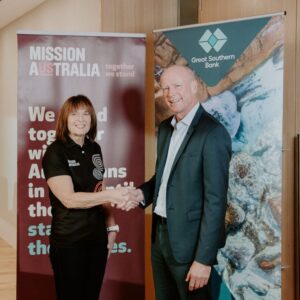 Mission Australia and Great Southern Bank have come together for a new community partnership aimed at cutting utility bills and reducing emissions for hundreds of Australians living in community housing.
Mission Australia and Great Southern Bank have come together for a new community partnership aimed at cutting utility bills and reducing emissions for hundreds of Australians living in community housing.
The bank will invest $1 million over the next three years in funding energy and water efficiency upgrades across hundreds of properties managed by the national community housing provider along the eastern seaboard of Australia, starting with New South Wales.
The initiative comes as electricity prices continue to rise across Australia.
“This is a unique opportunity to collaborate and co-design a ground-breaking program with the potential to tackle what we know are complex and layered issues. Not only does this program address cost of living challenges, but it also allows us to work together to take meaningful climate action,” said Mission Australia CEO, Sharon Callister. Read more.
Communicare hosts Singaporean delegation to learn more about Breathing Space
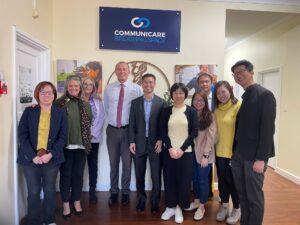 Communicare recently hosted a visit with a delegation from the Ministry of Social and Family Development Singapore to learn more about their Breathing Space residential men’s behaviour change program in Calista.
Communicare recently hosted a visit with a delegation from the Ministry of Social and Family Development Singapore to learn more about their Breathing Space residential men’s behaviour change program in Calista.
The delegation also included representatives from Singapore’s National Council of Social Services, Ministry of Home Affairs and Singapore Prison Services.
The delegation was keen to learn more about their unique Breathing Space model, which was the first program of its kind in the Southern Hemisphere when it opened its doors 20-years-ago.
Breathing Space demonstrates how – in a relatively short period of time – men who use violence can be introduced to positive strategies for long-term change. The program also provides an alternative to removing women and children from their family home, allowing them to stay connected with social and community support networks.
SA Child Protection Awards 2023
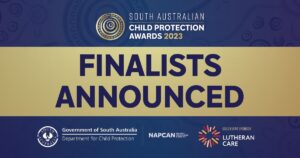 Congratulations to FRSA Members who’s staff have been announced as finalists in the South Australian Child Protection Awards 2023.
Congratulations to FRSA Members who’s staff have been announced as finalists in the South Australian Child Protection Awards 2023.
The awards celebrate the outstanding achievements of children and young people, carers, volunteers, staff and organisations from across the child protection sector.
Winners will be announced on Friday, 8 September.
FRSA Members listed as finalists:
- Rhonda and Brad Jacob, Centacare Catholic Family Services who is nominated for the Active Efforts Award
- Newpin Team, Uniting Communities who are nominated for the Outstanding Service Award: Non-government organisations
- Emily Ware, Centacare Catholic Country SA who is nominated for the Outstanding Service Award: Regional
- Lorraine Joy, supported by Key Assets, Maxine and Stephen Bowden, supported by Uniting Country SA, Sonia and Brenton Smith, supported by Uniting Country SA and Lisa O’Malley, supported by Lutheran Care are nominated for the South Australian Foster Carer of the Year
- Brooke Oliver, Relationships Australia SA is nominated for the voice of children and young people in care
- Dr Jackie Amos, Centacare Catholic Family Services and Nancy Penna, Anglicare SA are nominated for the Life Achievement Award.

Survey - National Mental Health Commission: Understanding how wellbeing could be included in national early childhood health checks
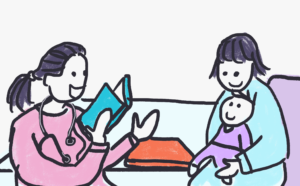 The National Mental Health Commission is leading a project to develop National Guidelines to support states and territories to include wellbeing in early childhood health checks (covering children aged 0-5), so any social or emotional difficulties can be identified early and in a nationally consistent way.
The National Mental Health Commission is leading a project to develop National Guidelines to support states and territories to include wellbeing in early childhood health checks (covering children aged 0-5), so any social or emotional difficulties can be identified early and in a nationally consistent way.
Mental health concerns often begin during childhood and an estimated 50% of adult mental illness begins before 14 years of age. Evidence indicates the first 2,000 days of life are a critical period, and interventions during this time can result in significant improvements to children’s early life experiences, health, and development.
Click here to complete the survey, it takes approximately 15 minutes to complete and refers to children aged between 0-5 years. The survey closes Sunday, 20 August 2023.
2023 Emerging Minds National Workforce Survey for Child, Parent and Family Mental Health
 The 2023 Emerging Minds National Workforce Survey for Child, Parent and Family Mental Health is now open.
The 2023 Emerging Minds National Workforce Survey for Child, Parent and Family Mental Health is now open.
The survey gathers important data on the capabilities among the Australian health, social and community services workforce by exploring knowledge, skills, confidence, challenges and practice in managing and responding to children’s mental health needs.
The survey results aim to help guide policy, advocacy and learning that addresses the future needs and demands of the Australian workforce. These results will also guide the development of Emerging Minds resources.
Health, social and community services practitioners from across Australia are invited to participate whether you:
- have a focus on child clients, adult clients, or families; or
- don’t work directly with clients but do work in health, social or community service sectors.
The survey closes on 15th November 2023. Click here to complete the survey.
If you have any further enquiries or wish to register your interest in the dissemination of findings, please contact Dr. Melinda Goodyear, Manager of Research and Evaluation at Emerging Minds, at goodyearm@emergingminds.com.au.
National Child Protection Week 2023
 National Child Protection Week is coming up 3-9 September 2023. The week continues to champion the message ‘Every child in every community needs a fair go’. This year that message is complemented with the theme, ‘Where we start matters’.
National Child Protection Week is coming up 3-9 September 2023. The week continues to champion the message ‘Every child in every community needs a fair go’. This year that message is complemented with the theme, ‘Where we start matters’.
Where we start as a service sector in offering children and their families support and assistance makes a significant difference to life outcomes.
The week aims to bring together partners to focus on addressing the significant harms being experienced by children in Australia. By working collectively to change the trajectory of these children and families, we can reduce the number of children who may come in contact with the child protection system.
Find out more information about the week, how to get involved and download resources via the NAPCAN website.
Wear It Purple Day
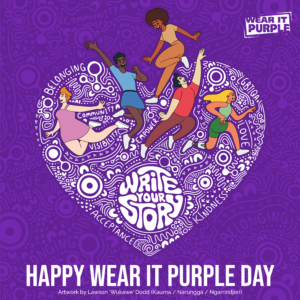 Wear It Purple Day is coming up on 25 August 2023. The day is an annual LGBTIQA+ awareness day especially for young people. Supporters are encouraged to wear purple to celebrate diversity and young people from the LGBTIQA+ community.
Wear It Purple Day is coming up on 25 August 2023. The day is an annual LGBTIQA+ awareness day especially for young people. Supporters are encouraged to wear purple to celebrate diversity and young people from the LGBTIQA+ community.
This year’s theme is ‘Write your story’ and aims to give voice to the LGBTQIA+ youth community around the importance of personal expression and individuality. This process of storytelling can be empowering and affirming and by speaking from their hearts, young people can also contribute to a broader cultural shift towards greater acceptance and visibility for LGBTQIA+ individuals.
Register your Wear It Purple event or download resources from their website.
Tough Conversations™ for Frontline Staff
Child & Adolescent Mental Health Conference
Supporting children who have experienced trauma course | First intake commences 25 September, 2023 | Flinders University and Emerging Minds
This 12-week micro-credential designed to support and guide participants learning on interpersonal trauma and its impacts on children. No matter which context you work in, this topic will help you to work with children and their families with increased confidence and skill, providing them with the support that they need.
The course includes four 90-minute seminars presented by Flinders University and Emerging Minds as well as fortnightly quizzes, a recorded presentation and subsequent self-analysis of the presentation where upon successful completion, you will be awarded the micro-credential in the form of a PDF certificate.
NSW
Family Dispute Resolution Practitioner | CatholicCare Wilcannia-Forbes
QLD
Family Dispute Resolution Practitioner | UnitingCare Community
Group Facilitator & Counsellor | UnitingCare Community
Family Counsellor | UnitingCare Community
Counsellor | UnitingCare Community
Child and Family Case Practitioner | UnitingCare Community
NT
Family Dispute Resolution practitioner | Relationships Australia NT
Counsellor – Family and Relationship Services | Relationships Australia NT
If you have any events you’d like listed on the FRSA Events and Training Calendar or job vacancies you’d like listed on the FRSA Jobs Board, email Communications Officer, Vanessa Lam at communications@frsa.org.au. Please note that posting onto the FRSA website is reserved for FRSA Members only.

The Beyond Blue Universal Aftercare Policy Series | Beyond Blue
Over the last decade, Beyond Blue has built a body of knowledge and insights from the operational implementation of The Way Back Support Service and from the national evaluation, conducted by Nous, of the service. As Beyond Blue has now handed over its role in the delivery of the service, this series of policy deep dives has been developed to capture and share these insights and learnings across three policy areas:
- Building a sustainable universal aftercare workforce through the development of a national capability framework.
2. Improving access to universal aftercare for groups disproportionally impacted by suicide through the safe expansion of participant-centred referral pathways.
3. Demonstrating what effective universal aftercare looks like through a rigorous independent evaluation right from the start.
Beyond Blue recommends that these insights and learnings are considered by policy makers and service commissioners responsible for the design, implementation and outcomes measurement of universal aftercare.
The Staying Deadly Survey: The Queensland Urban Indigenous Mental Health Survey Report | Queensland Centre for Mental Health Research
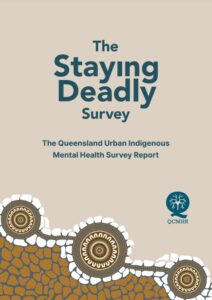 This is the first epidemiological study to report on mental disorders, harmful substance use prevalence and service use within a community residing, urban Aboriginal and Torres Strait Islander population in Southeast Queensland. Data collection was undertaken in 2022. Findings have indicated high rates of mental disorders and harmful substance use prevalence within this population, and important barriers within the mental health services they accessed.
This is the first epidemiological study to report on mental disorders, harmful substance use prevalence and service use within a community residing, urban Aboriginal and Torres Strait Islander population in Southeast Queensland. Data collection was undertaken in 2022. Findings have indicated high rates of mental disorders and harmful substance use prevalence within this population, and important barriers within the mental health services they accessed.
Reporting child abuse and neglect | Australian Institute of Family Studies
This resource sheet provides information to service providers and practitioners working in the child, family and community welfare sector on how to report suspected child abuse and neglect. It defines child abuse and neglect and provides contact details for the reporting authority in each state and territory.
Keeping spirit strong | Healing Foundation
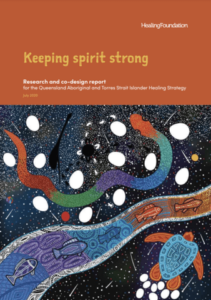 This report links research and knowledge about Aboriginal and Torres Strait Islander wellbeing and trauma, with the results of yarning about healing with more than 400 Aboriginal and Torres Strait Islander people across Queensland. The evidence in this report shows Aboriginal and Torres Strait Islander led healing approaches effectively address trauma, improve wellbeing outcomes, and deliver cost benefits.
This report links research and knowledge about Aboriginal and Torres Strait Islander wellbeing and trauma, with the results of yarning about healing with more than 400 Aboriginal and Torres Strait Islander people across Queensland. The evidence in this report shows Aboriginal and Torres Strait Islander led healing approaches effectively address trauma, improve wellbeing outcomes, and deliver cost benefits.
Rare, brief and non-recurring: a system wide approach to ending homelessness together | Homelessness NSW
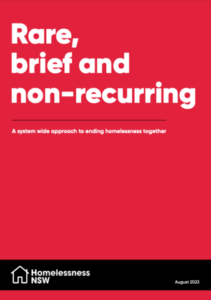 The purpose of this research was to gain different perspectives to build and consolidate an understanding about the biggest challenges to ending homelessness and the conditions that continue to hold these challenges in place. By working together to understand these, Homelessness NSW has also identified several key levers that can be actioned by a network of system actors for aligned, yet independent, action to shift the conditions.
The purpose of this research was to gain different perspectives to build and consolidate an understanding about the biggest challenges to ending homelessness and the conditions that continue to hold these challenges in place. By working together to understand these, Homelessness NSW has also identified several key levers that can be actioned by a network of system actors for aligned, yet independent, action to shift the conditions.
Ageing in a housing crisis: older people’s insecurity and homelessness in Australia | Swinburne University of Technology
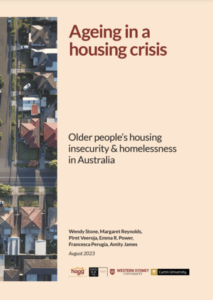 This report refocuses attention on systemic challenges within Australia’s housing system that underpin the increasing burden of housing insecurity and, in some cases, homelessness, borne by people living in Australia as they age.
This report refocuses attention on systemic challenges within Australia’s housing system that underpin the increasing burden of housing insecurity and, in some cases, homelessness, borne by people living in Australia as they age.
Support online: user experiences of digital platforms in the NDIS market | Brotherhood of St Laurence
 This study found that digital platforms can offer increased choice and control over their support to people with disability. However, reforms to the regulatory environment and funding for workforce development are needed to achieve the best outcomes for workers and people with disability.
This study found that digital platforms can offer increased choice and control over their support to people with disability. However, reforms to the regulatory environment and funding for workforce development are needed to achieve the best outcomes for workers and people with disability.
Waithood: the experiences of applying for and waiting for social housing | Institute for Public Policy and Governance
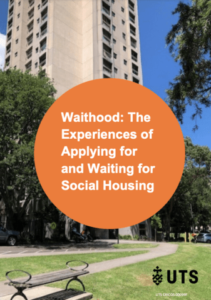 The approximately 175,000 households across the country on the social housing waiting list (waitees) are among the most vulnerable people in Australia, yet very little is known about their everyday lives and the challenges they face. Drawing on 75 in-depth interviews with waitees in New South Wales, Queensland and Tasmania, this report gives a voice to waitees.
The approximately 175,000 households across the country on the social housing waiting list (waitees) are among the most vulnerable people in Australia, yet very little is known about their everyday lives and the challenges they face. Drawing on 75 in-depth interviews with waitees in New South Wales, Queensland and Tasmania, this report gives a voice to waitees.
Mapping Australia’s older, low-income renters | Australian Housing and Urban Research Institute
 The study aims to find solutions for the challenges posed by population aging and housing needs in the 21st century. Projections show a substantial increase in older individuals needing affordable housing, reaching around 440,000 households aged 55 and over by 2031. Public housing is unlikely to meet this demand. The most significant growth in LIRiA50+ populations is expected in peri-urban and outer-suburban regions, with some regional areas also experiencing notable rises. Understanding this data is vital for planning and providing appropriate and affordable housing solutions to address this emerging issue.
The study aims to find solutions for the challenges posed by population aging and housing needs in the 21st century. Projections show a substantial increase in older individuals needing affordable housing, reaching around 440,000 households aged 55 and over by 2031. Public housing is unlikely to meet this demand. The most significant growth in LIRiA50+ populations is expected in peri-urban and outer-suburban regions, with some regional areas also experiencing notable rises. Understanding this data is vital for planning and providing appropriate and affordable housing solutions to address this emerging issue.
Understanding and responding to loneliness | Elder Abuse Action Australia
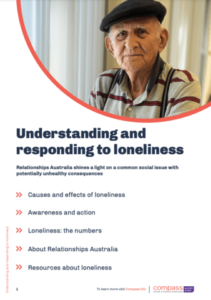 Loneliness as a social issue is gaining attention in Australia and abroad. Researchers, organisations, and policymakers are studying its causes, impacts, and effective responses. Loneliness is a complex emotional state when intimate and social needs are unmet, arising from dissatisfaction with relationships and periods of exclusion. It differs from being alone or socially isolated. Social isolation may result from factors like living alone and limited social networks, putting individuals at risk.
Loneliness as a social issue is gaining attention in Australia and abroad. Researchers, organisations, and policymakers are studying its causes, impacts, and effective responses. Loneliness is a complex emotional state when intimate and social needs are unmet, arising from dissatisfaction with relationships and periods of exclusion. It differs from being alone or socially isolated. Social isolation may result from factors like living alone and limited social networks, putting individuals at risk.
However, loneliness is subjective, and the size of one’s social network may not correlate with feelings of loneliness. Loneliness is now considered a public health concern due to its potential physical and mental health impacts. This resource explores the causes, effects, and awareness of loneliness, providing valuable statistics and resources.
Fast Facts on Family and Gender-based Violence 2023 | Safe and Equal
 Fast Facts provides an overview of statistics and key facts related to experiences and impacts of family and gender-based violence, and changing social attitudes towards these.
Fast Facts provides an overview of statistics and key facts related to experiences and impacts of family and gender-based violence, and changing social attitudes towards these.
Average Weekly Earnings, Australia | Australian Bureau of Statistics
Average weekly ordinary time earnings for full-time adults was $1,838 in May 2023, according to new seasonally adjusted figures.
The gap in average weekly ordinary full-time earnings, the most commonly cited of the gender pay gap measures, fell for the second straight cycle to the lowest level on record, down to 13.0 per cent. The gap is now around 0.9 points lower than just before the pandemic (13.9 per cent in November 2019).
Want to submit something to the FRSA eBulletin?
If you have an news item or event that you would like to be featured in a future eBulletin please submit your announcement via the form below or email communications@frsa.org.au with the subject “FRSA eBulletin submission”.
Please note FRSA members receive priority for items posted in the eBulletin. And to keep information current, relevant and useful, submissions will not be repeated from week to week.
Subscribe
Subscribe to receive future eBulletin editions directly to your inbox!








